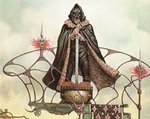
Gene Wolfe, author of “The Book of the New Sun” and other acclaimed works of science fiction and fantasy, died Sunday at the age of 87.
According to Locus, his death came after a long struggle with heart disease.
While Wolfe was never quite as famous as some of his peers, his writing was loved intensely by his fans. Ursula Le Guin, for example, called him “our Melville,” while Michael Swanwick described him as “the greatest writer in the English language alive today.”
That level of praise (and comparisons between his best-known work and James Joyce’s “Ulysses”) might seem hyperbolic — unless you’ve actually read his best novels and stories. To some, Wolfe’s writing represents science fiction’s strongest claim toward creating capital-L Literature.
The four-volume “Book of the New Sun,” published between 1980 and 1983, remains his best-known single work. It tells the story of Severian, a wandering torturer on Earth (“Urth”), billions of years in the future. The writing in “New Sun” is evocative and tricky, with an unreliable narrator obliquely explaining Wolfe’s far-future setting.
Wolfe’s reputation for density and difficulty may have scared some readers away, while also encouraging careful rereading and enthusiastic exegesis from his most devoted fans — but that reputation undersells the pleasure found in his writing.
Decoding his best stories is fun, just as it’s fun to explore the vast city of Nessus in “The Shadow of the Torturer.” He could also use that talent for subtlety to craft an unsettling horror story like “The Tree Is My Hat,” or an equally unsettling character study like “The Death of Doctor Island.” (The reason Wolfe wrote the latter story, and the similarly titled “The Doctor of Death Island” and “Death of the Island Doctor,” is one of my favorite bits of science fiction trivia.)
And then there’s “Forlesen,” a surreal afterlife fantasy that somehow compresses an entire lifetime of office drudgery into a single day. In the end, the titular character asks, “I want to know if it’s meant anything. If what I’ve suffered — if it’s been worth it.”
The answer? “No. Yes. No. Yes. Yes. No. Yes. Yes. Maybe.”
Ursula K. Le Guin, author of ‘The Left Hand of Darkness’ and ‘A Wizard of Earthsea’, has died
Read more: techcrunch.com
